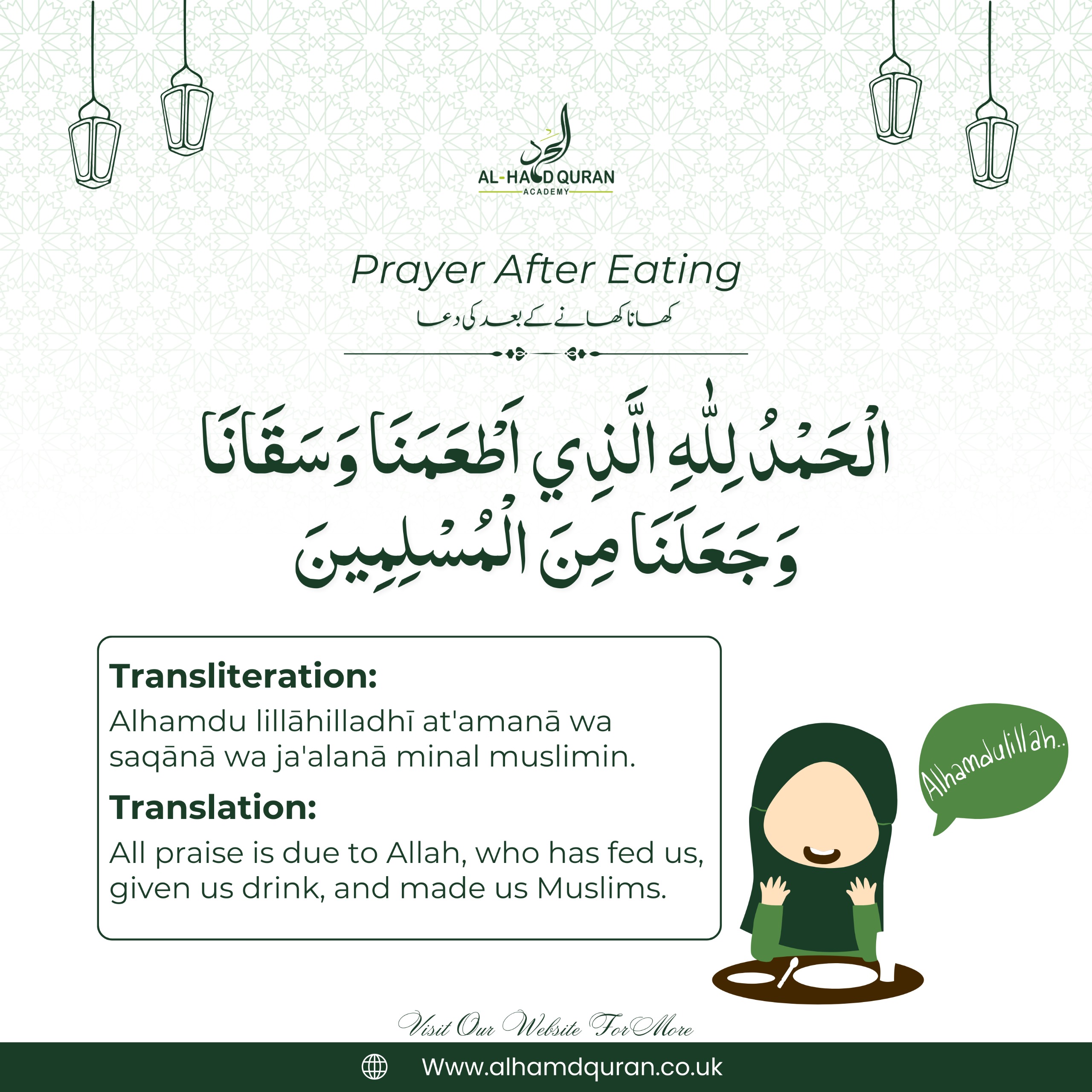Dua After Eating – Gratitude in Islam
Eating food is one of the greatest blessings from Allah (SWT), and Islam teaches us to express gratitude for every meal. One of the beautiful Sunnahs of Prophet Muhammad (ﷺ) is to recite the Dua After Eating, thanking Allah for providing sustenance.
This article covers:
- The authentic dua after eating (Arabic, English & transliteration)
- Hadiths related to this supplication
- Benefits of saying this dua after meals
- Common mistakes related to this dua
- Additional Sunnah etiquettes for eating
Dua After Eating (Supplication After Meals)
📖 ٱلْحَمْدُ لِلَّهِ ٱلَّذِي أَطْعَمَنَا وَسَقَانَا وَجَعَلَنَا مِنَ ٱلْمُسْلِمِينَ
Alhamdu lillāhilladhī at‘amanā wa saqānā wa ja‘alanā minal muslimīn.
Translation: "All praise is due to Allah, who has fed us, given us drink, and made us Muslims."
Hadiths About Reciting Dua After Eating
1. Gratitude for Every Meal
“Indeed, Allah is pleased with the servant who eats food and praises Him for it, or drinks a drink and praises Him for it.”
(Sahih Muslim 2734)
2. A Way to Earn Allah’s Forgiveness
“Whoever eats a meal and says, ‘Alhamdulillahilladhi at‘amani hatha wa razaqanihi min ghayri hawlin minni wa la quwwatin’ ... his past sins will be forgiven.”
(Jami` at-Tirmidhi 3458, Hasan)
Benefits of Reciting the Dua After Eating
- Gratitude: Reminds us to thank Allah for every blessing, big or small.
- Barakah: Invites blessings into food, health, and wealth.
- Forgiveness: Erases past sins through sincere dua.
- Strengthens Iman: Builds a closer relationship with Allah.
- Fulfills a Sunnah: Rewards in the Hereafter by following the Prophet’s practice.
Common Mistakes Regarding the Dua
- Forgetting to say the dua after eating.
- Not teaching children this beautiful Sunnah.
- Only saying "Alhamdulillah" instead of the complete dua.
- Thinking this dua is only for big or formal meals.
Sunnah Etiquettes of Eating
- Start with Bismillah: "Bismillah wa ‘ala barakatillah"
- Eat with the right hand – (Sahih Muslim 2020)
- Eat from the side of your plate – a sign of respect and discipline.
- Finish your meal completely – avoid waste.
- Drink in three sips – a healthy prophetic habit.
- Sit while eating – supports better digestion.
- Don’t blow on hot food – wait patiently.
- Dua for the host: اللَّهُمَّ بَارِكْ لَهُمْ فِيْمَا رَزَقْتَهُمْ وَاغْفِرْ لَهُمْ وَارْحَمْهُمْ
Conclusion: Make It a Daily Habit
The dua after eating is a short yet powerful way to express gratitude, gain barakah, and seek forgiveness. Incorporate it into your daily routine and teach your children this beautiful Sunnah.
✅ Recite the dua after every meal
✅ Gain rewards, forgiveness, and blessings
✅ Teach kids and family to follow this Sunnah daily
